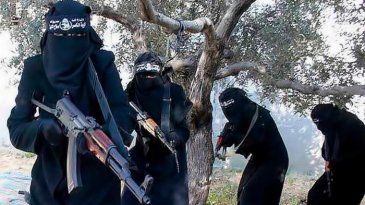Da’esh has stunned the world with its gross human rights abuses, gendered violence, and practices of sexual slavery, and yet, the organization has attracted a large amount of female recruits. Women who have joined Da’esh have been met with a storm of disbelief and gendered commentary, and have even been designated their own term – ‘jihadi brides’.

A screen shot of an Islamic State propaganda showing the Al-Khansa, an all-female police squad.
A recent policy brief explores agency and women in Da’esh: why women join, their roles, and how women are treated if they return to the West. The brief illuminates how gendered understandings of Western female foreign fighters are affecting judicial processes and potentially creating gaps in our security structure.
- Women may be drawn to Da’esh by the same various reasons as men, for example ideolody and belonging. A call to the Caliphate, and a wish to strengthen the Ummah (Muslim Community).
- Gendered perceptions of violence and extremism affect how women in Da’esh are described, presented, and reacted to.
- A number of court cases across the West have resulted in shorter sentences or pardons for women who have returned from Da’esh. The judgments and reporting around the issue area are often seeped in gendered commentary, presenting these women as misunderstood victims rather than motivated agents.
- Generalizing women in Da’esh as misled victims must be avoided, both for the sake of judicial precedent and from a security standpoint. Women need to be considered as full agents.
Read more in the recent Policy Brief from PRIO Centre on Gender, Peace and Security.